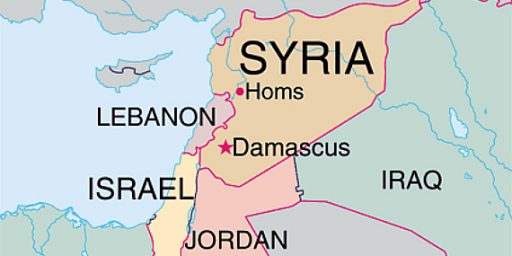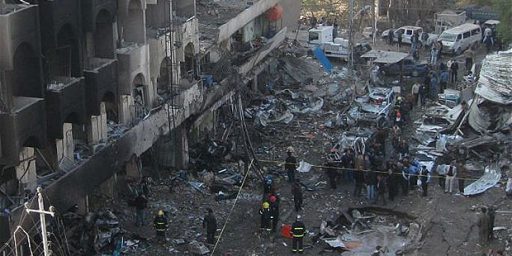Iraqi Shiite and Sunni Leaders Seek to Ease Tensions
Key Iraqi Sunni and Shi’a leaders are meeting to try to quell three weeks of increased violence that followed the formation of the country’s first democratic government.
Iraq Official Killed; Cleric, Sunnis Meet (AP)
Aides of a radical Shiite cleric met on Sunday with a key Sunni group seeking to ease sectarian tensions in Iraq, while gunmen killed a top trade ministry official as a spree of violence that followed the announcement of a new government entered its fourth week. Iraqi authorities also released Ghazi Hammud al-Obeidi, one of the most-wanted officials from Saddam Hussein’s former regime, because he is apparently terminally ill, Justice Minister Abdel Hussein Shandal and the suspect’s lawyer said Sunday. Also Sunday, three Romanian journalists and their Iraqi-American guide who had been held hostage for nearly two months in Iraq were released.
Senior aides of anti-U.S. cleric Muqtada al-Sadr met a key Sunni group in a bid to soothe tensions that have flared amid violence that has killed at least 550 people, including 10 Shiite and Sunni clerics, since the new Shiite-dominated government was announced on April 28. “There is a wound that needs to be treated and Muqtada was the first to offer his medicine,” said Sheik Abdul Salam al-Kubaisi, spokesman for the Sunni Association of Muslim Scholars after the talks with the al-Sadr delegation.
[…]
Sunni leaders announced Saturday that they had formed an alliance of tribal, political and religious groups to help Iraq’s once dominant minority break out of its deepening isolation following a Shiite rise to power after Saddam’s ouster. The Sunni fall from grace is regarded by many as a key source of Iraq’s raging insurgency, which claimed more victims Sunday, including Trade Ministry official Ali Moussa and his driver. They were killed in a drive-by shooting while heading to work, ministry spokesman Faraj al-Jaafari said. Moussa ran the ministry’s auditing office and was a junior official during Saddam’s regime.
It is unfortunate that the Sunnis decided to sit out the writing of the interim constitution and participation in the elections. One hopes that, given the stakes, the final constitution will create a federalist system with substantial autonomy for each of the three major groups.
One of the things that continues to fascinate me about Muslim culture–we’ve seen it in Afghanistan, Pakistan, and Iraq on multiple occasions–is the willingness to simply release the most heinous criminals for no apparent reason. While I understand the sensitivity against creating martyrs, it makes little sense to let mass murderers go free just because they’re old, sick, or have promised to play nice.
(1131) More: Iraq’s Sunni Arabs Seek to Unite to Build Political Clout (LAT)
A newly formed alliance of Sunni Muslim leaders held its first meeting here Saturday to forge plans for gaining a greater voice in Iraq’s emerging political culture. But the session’s acrimonious exchanges and demands on the country’s fledgling Shiite leadership made it clear that Sunnis had a long way to go before they could recover any of the clout they lost when President Saddam Hussein was toppled by the U.S.-led invasion in 2003.
The Sunni congress Saturday, attended by 1,000 delegates, demanded the resignation of newly appointed Interior Minister Bayan Jabr, a Shiite. At a news conference, Jabr rejected the call and said that the failure of most Sunni Arabs to vote in the Jan. 30 national election had resulted in a self-inflicted exclusion. “Those who didn’t vote have no right to ask for this,” he said.
I don’t mind them asking. And, indeed, I certainly prefer that they accomplish what they can via the political institutions rather than the gun or the roadside bomb.
The minority community, which accounts for less than 20% of Iraq’s population, was favored under the regime of Hussein, who was a Sunni. Shiites, about 60% of the population, and ethnic Kurds, both oppressed by Hussein’s Baathist regime, now hold the reins of power.
Payback is hell. Still, one hopes that cooler heads will prevail. So far, it appears that much of the Shi’a leadership understands that there will be no peace in Iraq unless they figure out a way to accomodate the Sunni minority.






What about the possibility that the Bush Theocracy
with its massive propaganda component is manipulating the population to create the very divisiveness that you decry.
The bush theocracy has done that guite well in maintaining power in the USA –
keep the people fighting amongst themselves and they will not notice the actions of the criminal administration ripping them off.
Here we go again with the eeeeeeeeeevil Bush neocon theocracy.
There is no parody like self-parody.
McGehee, so you think if you stick your fingers in your ears and repeat “not listening, not listening” loud enough reality will cease to be a burden for you?
Mike, if there really is a neocon theocracy, you’re welcome to provide evidence.